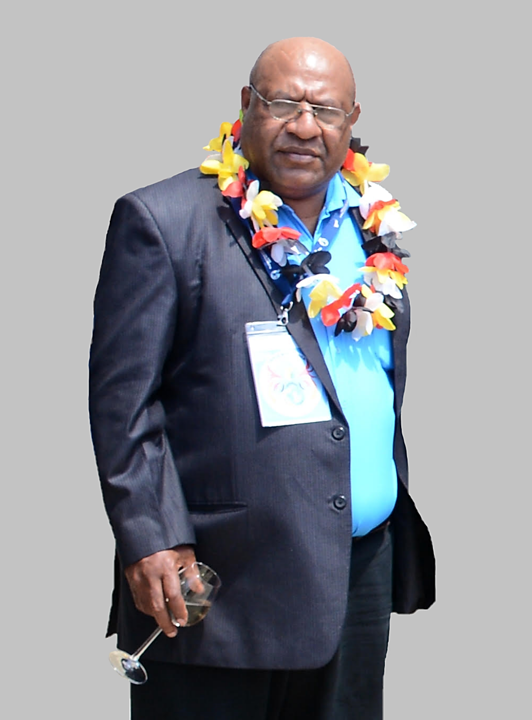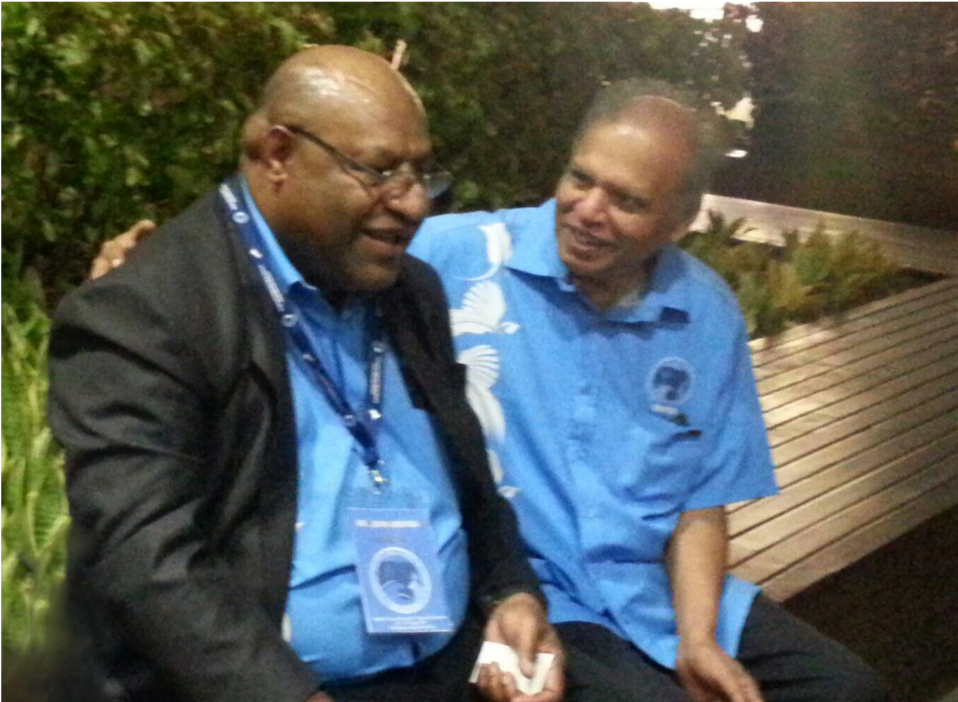It is with profound grief that I recall fond memories of Mr. John Arumba, Former Deputy Secretary, Department of Mineral Policy and Geohazards Management, Government of Papua New Guinea, who passed away on 22 June 2019 at the age of 51. Mr. Arumba was a great leader that had grand vision, total commitment and devotion to his duties and responsibilities as a public official, and passion to pursue what he believed was the need of the hour for the benefit of his country and its people. He was meticulous in the design, development, and execution of plans and programs. I discovered these about him when I had a mission to Papua New Guinea in February 2011, with objective of assessing needs for enhancing the country’s early warning system and how RIMES could assist in meeting these needs.
Mr. John Arumba represented the Government of Papua New Guinea in the signing of the RIMES Cooperation Agreement on 13 March 2011, which ensured Papua New Guinea with a seat in the RIMES Council. As Member of the RIMES Council, Mr. Arumba guided RIMES policies and programs with his insightful thoughts and rich experiences, to help RIMES to attain greater heights. He proved to be one of the towering personalities of the RIMES Council, which is composed of heads of institutions that generate forecast and warning information in 38 countries of the Asia, Africa, and Pacific regions. The RIMES Council heeded his ideas, suggestions, and thoughts respectfully and with great admiration. He enriched RIMES forum discussions and deliberations with his robust intellectual acumen, superb leadership qualities, deep understanding of complex issues, and elucidation of those issues with evidences and examples. He, thus, shined like a star among peers from other nations, and received wide admiration and acclaim among the international community. He contributed to a well-deserved image and reputation of Papua New Guinea as a nation for which all the country’s citizens could be proud of.
I am very much pleased to highlight some of Mr. Arumba’s key contributions to RIMES policy and institutional development process.
Mr. Arumba’s association with RIMES was instantaneous, considering past and current experiences of functioning international institutions. He shared, with evidences, how international institutions perpetuated dependence of developing and least-developed countries on donors and international consultants by designing and implementing unsustainable, ad-hoc, and inappropriate projects, without contributing to capacity enhancement. He fashioned RIMES philosophy, policy, and programs to overcome such deficiencies. As a result of his policy advocacy, the RIMES Council adopted the following pathway for RIMES trajectories:
Through continuous engagement, build capacity of national hazard forecasting agencies to identify new/emerging technologies and products of research, customize these to meet country-specific requirements, pilot-test in a user environment, and refine and transfer to national institutions for integration into operations. RIMES provides technical and, if needed, financial assistance to Member States, until these are fully integrated into the country’s early warning system.
Because of Mr. Arumba’s policy advocacy of “pay for services principle”, the RIMES Council and the RIMES Ministers Conference resolved and declared in 2012 to fund RIMES core services through Member State contributions. This financial instrument is transforming RIMES as a vibrant and self-reliant international institution that is accountable to its Member States in meeting priority needs and demands. RIMES is the only international institution that is sustained by Member States themselves, without reliance on external donors, thus ushering an era of establishing new international cooperative system that is truly owned and managed by its Member States. Mr. John Arumba’s contribution shall be etched in the annals of international institutional development history. Benefits from this contribution shall be appreciated for generations to come.
Another key contribution by Mr. Arumba is the decentralization of RIMES services through establishment of RIMES sub-regional hubs, to serve more effectively a cluster of countries that are geographically and culturally homogeneous, considering RIMES’ trans-continental jurisdiction that covers the diverse and vast regions of Asia, Africa, and the Pacific. Through policy advocacy process, Mr. Arumba’s innovative ideas convinced the RIMES Council and the RIMES Ministers Conference to establish RIMES sub-regional hubs. Papua New Guinea embraced RIMES policy, and expressed willingness to serve as RIMES Sub-Regional Hub for the Pacific Region.
Armed with the 8th RIMES Council Meeting Resolution and the 2nd RIMES Ministerial Conference Declaration, Mr. Arumba worked with total devotion to integrate scattered early warning institutions in Papua New Guinea into a holistic system, to harmonize their roles and responsibilities through a historic Memorandum of Agreement, signed by all stakeholder institutions on 13 October 2016. The Papua New Guinea Government adopted an institutional framework of a national multi-disciplinary and multi-hazard early warning system that serves the region as RIMES Sub-Regional Hub for the Pacific. Such system is now being linked to the RIMES early warning information system. This empowered the Papua New Guinea National Multi-Hazard Early Warning System with state-of-the-art science and technology and international best practices and capabilities to serve the RIMES Sub-Regional Hub for the Pacific, covering all 14 Pacific Island Countries. Thus, Papua New Guinea reclaimed its rightful leadership role in the Pacific region, and set an EXEMPLARY institutional model, for RIMES’ replication in its other sub-regions, such as East Asia, Central Asia, South Asia, Southeast Asia, West Asia, Indian Ocean island Countries, West Coast of Africa, and other Africa Sub-Regions.

Mr. John Arumba at the inauguration of the Papua New Guinea National Multi-Hazard Early Warning System and RIMES Sub-Regional Hub for the Pacific
These two major contributions of Mr. John Arumba bear ample testimony to his sterling leadership qualities, great innovative out-of-the-box thinking, planning, and execution capabilities, tireless crusader, and institutional transformer. His personality traits included a positive bend of mind, to find solutions to intractable, complex problem; a team player who gets along well with all shades of opinions; and personal warmth and empathy to people’s needs. All these have enriched RIMES institutional and Papua New Guinea’s national development processes immensely.
I am sure that others would share Mr. John Arumba’s impeccable and enviable records of his achievements that have blazed a trail by his original thinking, laying grounds for solid work by peers, professionals, and leaders. He will be remembered forever for his ability in successfully relating himself to high standards of professionalism, powerful leadership, and scientific and technical skills, to meet the pressing needs of Papua New Guinea’s citizens, thereby improving their lives in a manner that has potential for replication in many other countries in the world.
I am indeed fortunate to have met this extraordinary gentleman, who had great sense of purpose and personal warmth, in the passage of my journey on this wonderful planet.

Mr. John Arumba and Mr. A.R. Subbiah (author)
Onward, RIMES shall be guided by Mr. John Arumba’s thoughts, philosophies, and commitments for all of its countries in the Asia, Africa, and Pacific regions.
A.R. Subbiah
Director, RIMES Program Unit